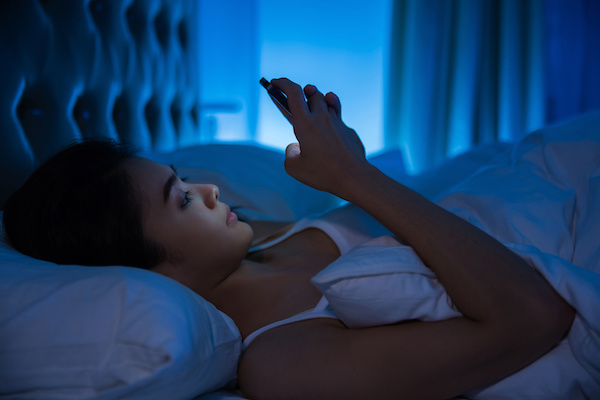
A scientific study conducted by the National Library of Medicine explains the link between blue light exposure and disrupted sleep cycles. The study claims that light with blue wavelengths are detrimental to our sleep-wake cycles and can even lead to the development of sleep disorders.
Using blue light devices before bed can delay or disrupt your sleep due to the effects on your pineal gland, melatonin production, and circadian rhythm.
Let’s dive into exactly how blue light affects your night.
The Effect of Blue Light on Your Pineal Glands
The pineal gland is a small gland within our brains. As a part of the endocrine system, it is responsible for secreting hormones, including the sleep hormone, melatonin.
The primary effect of how blue light impacts your pineal gland occurs through its disruption of your melatonin production.
How Does Blue Light Affect the Production of Melatonin?
Melatonin helps regulate your sleep cycle. Darkness or the absence of light triggers your body to produce melatonin, which in turn makes you sleepy. Normally, your pineal gland releases this hormone a few hours before you usually go to sleep.
However, the presence of light triggers the opposite effect and thereby reduces the production of melatonin and consequently makes you feel awake. The presence of blue light before bed leads to delayed bedtimes.
Additionally, not only does blue light reduce the secretion of melatonin while in use, but it also continues to suppress melatonin long after your exposure has ended. This can be observed particularly through disrupted REM cycles.
Blue Light and Your REM Cycle
Rapid eye movement, or better known as REM sleep, is something you experience approximately 90 to 100 minutes after you fall asleep. It’s a cycle that continues as you move through the sleep stages with periods of non-REM sleep that are followed by periods of REM sleep.
However, the prolonged exposure to blue light just before bedtime shortens your REM cycles, resulting in poor sleep and feeling tired the following day.
Blue Light and Your Circadian Rhythm
Your circadian rhythm is your body’s natural sleep-wake cycle that repeats every day. It’s what makes most of us want to sleep at night and wake up in the morning.
The effects of light on your circadian rhythm is twofold. One, as discussed above, is the relationship between blue light, our pineal glands, and the production of melatonin. The other is light’s ability to shift us through our circadian phases.
Now, the suprachiasmatic nucleus (SCN) of your hypothalamus is regarded as one of the key regulators of your circadian rhythm. This, in turn, is regulated by the intensity of light and how long you’re exposed to it.
Our 24-hour cycles were traditionally governed by sunrise and sunset. The introduction of artificial lighting has somewhat disrupted our biological rhythms because we are now in the presence of light for longer periods of time after sunset.
Timing is now the name of the game.
Studies show that those with more exposure to light at later hours experience more awakenings during their sleep cycle than those without. The same research also shows that exposure to intense daylight during the day can lead to an earlier bedtime and improved quality of sleep. Shorter exposure to light increases the duration of sleep and vice-versa. And in particular, blue light at night through the mediums of smartphones, television screens, and laptops is especially disruptive.
Does Blue Light Have the Same Effect As Daylight?
Not all light affects us the same way. Different lights have different colored wavelengths, and simply put, blue light is just light with blue wavelengths.
However, sunlight and most other sources of light are made up of a variety of wavelengths, including blue light rays, meaning it is not exclusive to your electronic devices. The difference lies between the proportion of blue light, and electronics usually have a higher degree.
The sun itself is made up of yellow, red, blue, green, and other shades of light rays. The combination of these colors creates “white light.” Each shade of color has varying amounts of energy, which is inversely proportional to the size of the wavelength.
While sunlight or daylight may have a proportion of blue light, it is also made up of other light. Your electronic devices, on the other hand, emit greater amounts of short-wave blue light, which demands more focus and energy from the viewer.
That is one of the reasons why excessive screen time can cause “digital eye strain.”
And that’s why the blue light effects are more prolonged and more detrimental to your sleeping patterns than lights with longer wavelengths.
Digital Devices and Your Sleep
In fact, exposure to lights with shorter wavelengths for more than two hours—within three hours of your bedtime—reduces your quality of sleep. Since it is also associated with delayed sleep, blue light is attributed to a shorter duration of sleep.
Blue light, more intensely than any other kind of light, reduces and suppresses your production of melatonin by the pineal gland and interferes with your sleep-wake cycle.
Therefore, if you want to reduce your screen time to improve your sleep quality, it is advisable to do so around three hours prior to when you intend to sleep.
Blue Light at Night: The Final Verdict
Blue light at night for prolonged periods does have a negative effect on your sleep. It disrupts the production of melatonin by your pineal gland, reduces the quality and duration of your sleep, and disrupts your body’s natural sleep-wake cycle.
Say goodnight to your blue light devices to get the sleep you deserve!




